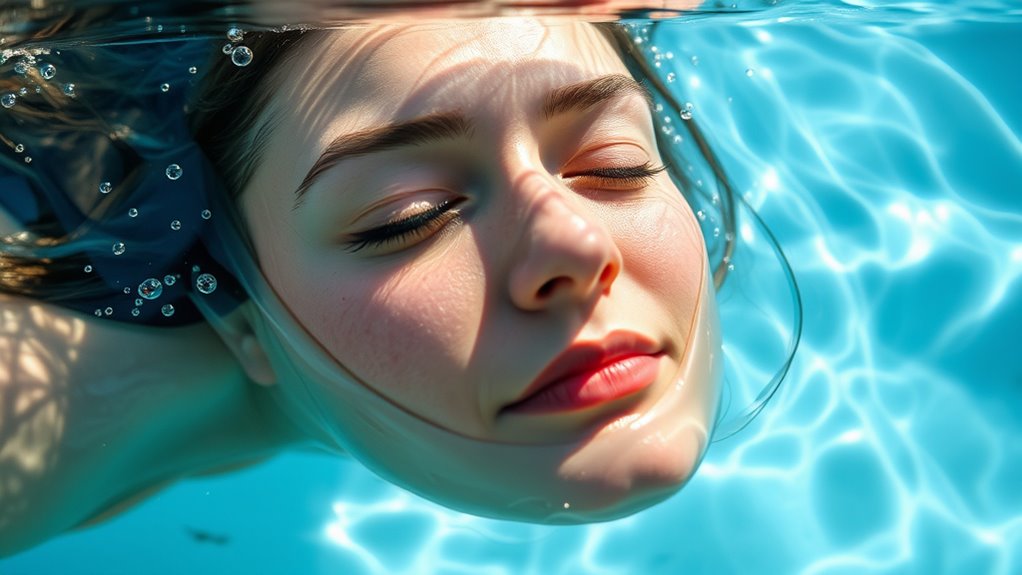Floating in water relaxes your nervous system by engaging your mind-body connection and reducing sensory input. Sensory deprivation quiets external stimuli, allowing your body and mind to unwind simultaneously. This process shifts your nervous system to a calmer state, lowering cortisol, heart rate, and blood pressure. As a result, you’ll feel more centered and stress-free. If you keep exploring, you’ll discover how this simple practice can profoundly boost your overall well-being.
Key Takeaways
- Water immersion triggers sensory deprivation, reducing external stimuli and calming the nervous system.
- Floating promotes parasympathetic activation, lowering heart rate, blood pressure, and stress hormones like cortisol.
- Being in water helps slow brain waves to alpha and theta states associated with relaxation and mental clarity.
- The sensation of weightlessness alleviates physical tension and mental stress simultaneously.
- Overall, water’s soothing environment supports emotional balance and enhances stress resilience.

Have you ever wondered how to melt away stress quickly and effectively? One powerful method involves immersing yourself in water, leveraging the mind-body connection and sensory deprivation to promote deep relaxation. When you float in a specially designed tank filled with warm, Epsom salt-laden water, you’re engaging in a unique experience that quiets the mind and relaxes the body simultaneously. This sensory deprivation reduces external stimuli, allowing your nervous system to reset and your thoughts to settle. The absence of sight, sound, and gravity creates an environment where your body can unwind without distraction, leading to a profound state of calm.
Floating in a warm, salt-filled tank quiets the mind and relaxes the body through sensory deprivation and mind-body connection.
The mind-body connection plays an essential role here. When you float, your body’s stress response diminishes because you’re removing many of the triggers that activate your sympathetic nervous system, such as noise, bright lights, and physical tension. Instead, your parasympathetic nervous system takes over, encouraging rest, digestion, and healing. As a result, your heart rate slows, blood pressure drops, and stress hormones like cortisol decrease. This physiological shift not only relieves immediate tension but also promotes long-term resilience against stress. You’ll notice that after floating, you feel more centered and refreshed—ready to face daily challenges with a calmer mind and more relaxed body.
Sensory deprivation during floating enhances this effect by stripping away the usual barrage of sensory input that often overwhelms your nervous system. Without external distractions, your brain can enter a state similar to meditation, characterized by alpha and theta waves associated with deep relaxation and creative insight. Many find that this quiet mental space fosters clarity, emotional balance, and even problem-solving abilities. You might experience a sense of floating beyond your physical self, which can lead to feelings of detachment from stressors and a greater sense of well-being. This environment encourages a mental reset, helping you detach from worries and anxieties that often dominate your day.
In essence, floating taps into the powerful interplay between mind and body by creating a space where stress naturally dissolves. The combination of sensory deprivation and the unique physical environment allows your nervous system to recalibrate, boosting your mental clarity and physical relaxation. It’s a simple yet deeply effective way to combat stress, improve emotional health, and reconnect with your inner calm. When you step out of the tank, you’re likely to notice a renewed sense of balance, ready to face whatever lies ahead with a clearer mind and a more peaceful body.
Frequently Asked Questions
Can Water Temperature Affect Stress Relief Effectiveness?
You might wonder if water temperature impacts stress relief. It definitely does, as it influences your sensory response. Warmer water can help relax your muscles and calm your mind, making you feel more at ease. Conversely, cooler water can invigorate and refresh you, reducing stress through a different sensory response. Adjusting water temperature to your preference can maximize the soothing benefits, helping you relax more effectively.
Does Floating Benefit Mental Health Beyond Anxiety Reduction?
You might find that floating offers mental health benefits beyond just reducing anxiety. When you practice mindfulness during sensory deprivation, you’re more present and relaxed, which can improve overall mood. Floating isolates your senses, helping you disconnect from daily stressors. This calming experience can boost mental clarity, enhance focus, and promote emotional resilience, making it a valuable tool for overall mental well-being beyond just anxiety relief.
Are There Specific Water Types More Calming Than Others?
Like a gentle lullaby, certain water types can enhance your calming experience. You might find mineral-rich waters, such as those in hot springs, more soothing due to their therapeutic properties. The water’s mineral content and mineral balance influence relaxation. Additionally, water color effects, like clear or blue hues, can promote tranquility by mimicking natural, peaceful environments. So, choosing waters with calming mineral compositions and soothing colors can deepen your relaxation.
How Long Should a Typical Floating Session Last?
For your float session, aim for about 60 to 90 minutes of float duration, which is generally enough to relax deeply without overdoing it. You should also consider session frequency—most people find 1 to 2 floats per week ideal for stress relief and relaxation. Adjust the float duration based on how your body responds, and listen to your comfort level to maximize the calming benefits of water immersion.
Can Floating Help With Sleep Disorders?
You might find that float therapy can improve your sleep quality. Many people report falling asleep faster and enjoying deeper rest after sessions. The relaxing environment of water helps calm your nervous system, reducing stress and anxiety that often interfere with sleep. Regular float therapy can establish a calming routine, making it easier to unwind at night and enjoy more restful, uninterrupted sleep.
Conclusion
As you drift in the water, let it symbolize a reset—a space where your worries dissolve like ripples fading away. Just as the water supports your body, it also lifts your mind from stress’s weight, allowing clarity and calm to emerge. Embrace this floating moment as a gentle reminder that sometimes, surrendering to the current is the key to renewal. In water’s embrace, you find not only relaxation but a quiet strength to face life’s tides anew.










